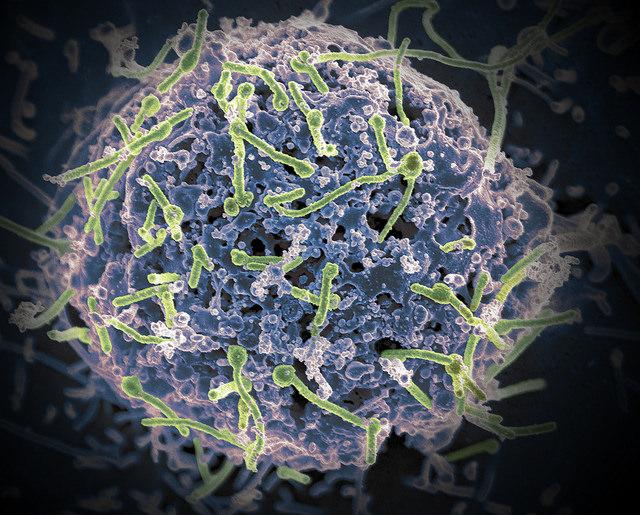A genetic analysis published today of Ebola virus samples over the course of the outbreak found few changes and noted that the virus is apparently more stable than a study back in August had suggested.
In outbreak region developments, a Liberian media outlet, citing government officials, said two more Ebola cases have been detected there. The country has had the steepest drop in cases and recently went more than 2 weeks without a case.
Gene study finds little change
A team from the National Institutes of Health (NIH) Rocky Mountain Laboratories in Hamilton, Mont., looked at samples from patients from three different countries at three different points in the outbreak last year: Guinea in March, Sierra Leone in June, and Mali in November. The group published its findings today in Science.
Last August, an international research team sequenced samples from 78 patients during the first 24 days of the outbreak in Sierra Leone, and they identified more than 300 genetic changes that made the outbreak strain distinct from ones that have sparked past outbreaks and was changing twice as fast as previously seen.
Some changes were in genome locations that encode proteins, which the earlier group warned might affect diagnostic tests.
In today's study, researchers said they found no genetic changes that would enhance the virulence or transmissibility of the Ebola virus circulating in West Africa. Though robust human-to-human transmission is occurring, the genetic changes aren't occurring faster than expected and are unlikely to interfere with diagnostic tests, candidate vaccines, or treatments that target Ebola.
Anthony Fauci, MD, director of the NIH's National Institute of Allergy and Infectious Diseases, said in a statement today that the findings are reassuring. "We look forward to additional information to validate this finding, because understanding and tracking Ebola virus evolution are critical to ensuring that our scientific and public health response keeps pace."
New Liberian cases?
Liberia's Anadolu Agency yesterday reported two more Ebola infections, in an 18-year-old woman who helped care for her mother, who was recently sick with the disease, and in a young man from New Kru Town. The news report cited Sompson Sieh, Liberia's deputy Ebola incident manager.
If confirmed, the cases would be the country's second and third cases since Mar 20, when a new infection was detected in a woman from Monrovia, which dashed the hopes of Liberia achieving Ebola-free status after it went 3 weeks without a new infection.
The World Health Organization (WHO) said in its latest case number update today that the three outbreak countries have reported 24,927 confirmed, probable, or suspected illnesses, along with 10,338 deaths. The total includes data from Guinea and Sierra Leone as of Mar 24 and Liberia as of Mar 22.
Today's totals reflect an increase of 55 cases and 27 deaths since the WHO's update yesterday.
US patient update, candidate vaccine
- The condition of a US health worker sickened with Ebola in Sierra Leone and being treated at the NIH Clinical Center in Bethesda, Md., has been upgraded from critical to serious, the NIH said in a statement today. The patient has been at the NIH hospital since Mar 13 and had been working with Partners in Health, an aid group headquartered in Boston.
- In a separate Science study today, researchers reported promising results in macaques for a new Ebola vaccine study. The team included researchers from the University of Wisconsin in Madison and the NIH's Rocky Mountain Laboratories. The new strategy is based on a whole virus in which researchers knocked out a key gene to make it nonpathogenic. To enhance the safety of the strategy, they also inactivated the whole virus with hydrogen peroxide. They found that one or two doses of the inactivated whole virus vaccine, with or without peroxide inactivation, protected the macaques against a lethal Ebola Zaire challenge. Several Ebola vaccines in development use a vector to deliver genetic material from the Ebola virus.
See also:
Mar 26 Science abstract of gene study
Mar 26 NIH press release on gene study
Mar 25 Anadolu Agency report
Mar 26 WHO update
Mar 26 NIH press release on Ebola patient
Mar 26 Science abstract on Ebola vaccine study


















